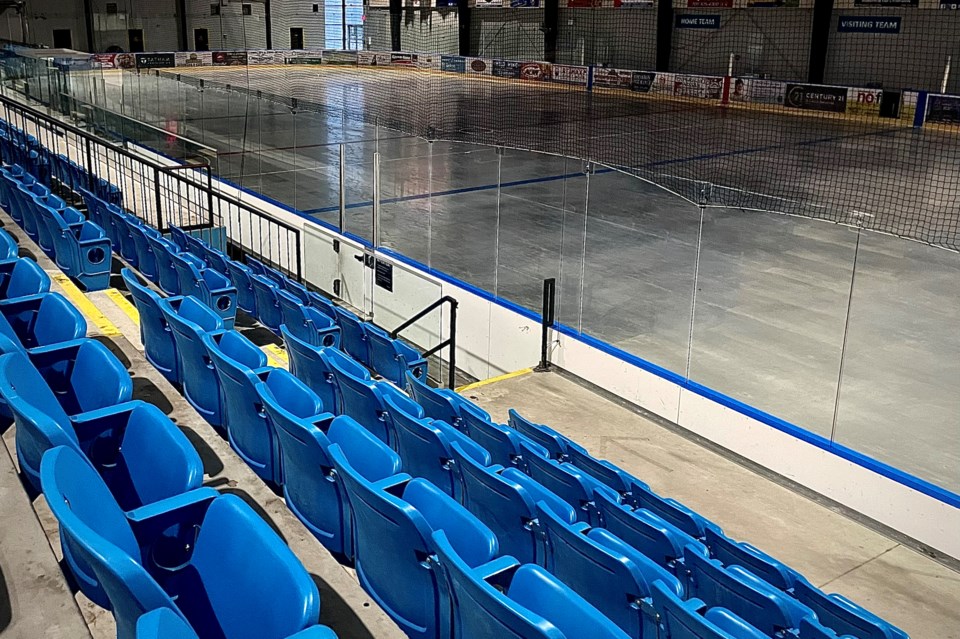Orillia city council has approved spending $1.9 million to address issues at Rotary Place following the arena’s second shutdown in three years from Legionella outbreaks traced to its cooling towers.
Approved at Wednesday’s council meeting, the funding will be used for a new indoor, self-contained compressor system and outdoor dry condenser to be designed, procured and installed at Rotary Place.
Orillia city staff prepared three options for council to consider, all of which use a dry, air-cooled chiller system, which eliminates the risk of future Legionella outbreaks, as opposed to the current, water-based system that may foster the waterborne Legionella bacteria.
“All long-term options considered and displayed … are to implement a dry-air-cooled system and move away from the current water-cooled system,” explained Renee Recoskie, the city’s manager of property and environmental sustainability.
Funding for the new cooling system will be sourced from the city’s general asset management reserve, which currently has a balance of $4.9 million.
The bill comes on top of $425,000 approved for an interim cooling system by council last week for up to 18 months.
“Do we have a guarantee … that this will be done in the most efficient way, and the … fastest way possible?” asked Coun. Ralph Cipolla. “The comments I’ve had is … why spend the 450,000, or whatever it is? Just close it down and do it right the first time.”
“Obviously, with anything we do, we look for the best financial results. If at all we can implement the project quicker, through receiving product on time, we will definitely look at that,” responded Andrew Schell, general manager of environment and infrastructure services.
“Part of our plan moving forward is to ensure that we have both user groups as well as our project construction looked after as efficiently as possible.”
Schell also assured Rotary Place would have ice in September 2023, given the interim system planned for installation by January, and that the 2024 installation of the new cooling system would likely take place during an “ice out” part of the year.
Coun. Jay Fallis questioned whether chemical treatments were possible for Rotary Place, and Recoskie said such a program is in place at the arena currently.
The recent rink shutdown and outbreak occurred in spite of a “robust maintenance and sampling plan” implemented following the Legionella outbreak in 2019 that was linked to the arena’s cooling tower, noted a staff report discussed at Wednesday’s council meeting.
Coun. Janet-Lynne Durnford said the issue has “highlighted the need for a registry of cooling towers.
“I think there’s a lot of information that we do not have because there is no way to access that information. It’s quite possible that there are other sources of Legionella in the community, and we have no way to assess that at this point.”
“The previous term of council did, in fact, support a motion that came from the (Simcoe Muskoka District Health Unit). The health unit was, in fact, penning a letter to the province to suggest to the province very strongly that there be a registry,” replied city CAO Gayle Jackson.
“I do understand, in my conversations with (the health unit), that a similar letter will, if it hasn’t already … be sent, and it’s certainly something that this council could issue with support.”
Coun. Tim Lauer questioned whether the upgrades to Rotary Place would comply with building retrofits likely to take place in Orillia through the climate action plan.
“Down the road, we obviously are going to do some climate action planning in regards to old buildings,” he said. “Would this fit into that retrofit?”
“This opportunity … doesn’t have any corresponding additional greenhouse gas emission impact, which is good. It relies on electricity, (and) our climate change action plan does look towards electrifying, where possible, within our facilities,” replied Recoskie.
“With respect to this system, it is supportive of the city’s climate change action plan.”





